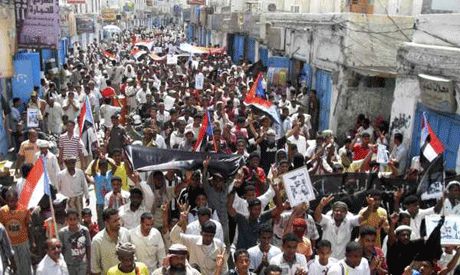
People demonstrate to demand for the ouster of Yemen's president Saleh in the southern port city of Aden, Sunday, (Reuters).
Yemen's president has fired a government minister for failing to persuade an expanding protest movement to end its month-long challenge to his 32-year rule over one of the most impoverished and volatile corners of the Arab world.
With no sign his opponents will accept anything less than his ouster, President Ali Abdullah Saleh has filled the streets with armed supporters in an increasingly violent crackdown. The opposition gained its own support Monday from striking workers, as well as from university professors and a growing number of powerful tribal chiefs turning against Saleh.
More unrest in Yemen is of deep concern to the United States and other world powers, in particular, because al-Qaida has established a potent offshoot in the country's mountainous hinterlands and has launched attacks beyond its border, including a failed attempt to blow up a U.S.-bound airliner in December 2009.
Even before the protests, which were inspired by the toppling of Arab autocrats in Tunisia and Egypt, Saleh's government barely had control beyond Yemen's capital and faced threats from rebels in the north and a secessionist movement in the once-independent south.
In a sign of his frustration, Saleh on Sunday fired the government minister in charge of trying to engage his opponents in dialogue, Hamoud al-Hattar, and replaced him with another Cabinet minister.
The protesters, fed up with corruption, poverty and a lack of political freedom, have demanded that Saleh step down and have rejected his offers to form a national unity government. Saleh also failed to appease the protesters with a pledge at the start of the unrest not to seek another term in office in 2013.
In the streets of the capital Monday, police and plainclothes security remained locked in a standoff with protesters camped out in a square near Sanaa University.
Hundreds more protesters were planning to reinforce them.
At least 100 people were injured Sunday in battles between the two sides.
The protesters are gaining support from tribal chiefs, senior officials and university professors. About 50 professors from the universities in the cities of Aden, Sanaa and Taiz have resigned from President Saleh's ruling Congress Party.
Amin al-Ukeimi, a leader of the powerful Bakeel tribe, announced Monday that he is joining the protesters in Sanaa, the capital, and supported their demand to bring down the regime. Mohammed al-Houri, an undersecretary at the Planning Ministry, also announced his resignation from the party.
The western part of the capital was paralyzed Monday by a strike called by trade unions to protest the government's harsh handling of the demonstrators and to demand higher wages.
Clashes with protesters also broke out beyond the capital Monday in the southern provinces of Aden, Hadramawt, Taiz and Hudaydah, and in Jawf in the northeast, where at least 20 people were injured.
To the east, the governor of Marib province was injured and flown by helicopter to a military hospital in the capital, security officials said, though it was not clear how he was hurt.
There was a large demonstration in front of the local government building there, the officials said, speaking on condition of anonymity because they are not authorized to brief the media.
In Taiz, police tried to disperse demonstrators with gunfire and tear gas, injuring three people.
Short link: